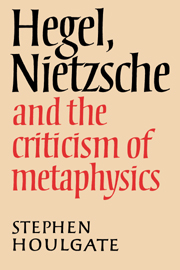Book contents
- Frontmatter
- Contents
- Preface
- Abbreviations and translations
- 1 The Hegel–Nietzsche debate
- 2 Nietzsche's view of Hegel
- 3 Nietzsche and metaphysics
- 4 Hegel and metaphysics
- 5 Speculative thought and language in Hegel's philosophy
- 6 Hegel's conception of the judgement
- 7 Context and the immanence of rationality in Hegel's Phenomenology
- 8 Hegel and Nietzsche on tragedy
- Notes
- Bibliography
- Index
7 - Context and the immanence of rationality in Hegel's Phenomenology
Published online by Cambridge University Press: 18 November 2009
- Frontmatter
- Contents
- Preface
- Abbreviations and translations
- 1 The Hegel–Nietzsche debate
- 2 Nietzsche's view of Hegel
- 3 Nietzsche and metaphysics
- 4 Hegel and metaphysics
- 5 Speculative thought and language in Hegel's philosophy
- 6 Hegel's conception of the judgement
- 7 Context and the immanence of rationality in Hegel's Phenomenology
- 8 Hegel and Nietzsche on tragedy
- Notes
- Bibliography
- Index
Summary
In the previous three chapters I have presented my arguments for considering Hegel to be a non-metaphysical philosopher. By claiming this, of course, I am maintaining neither that Hegel's philosophy has nothing to say about the real world, nor that it is merely a collection of provisional empirical conjectures. Hegel's is a non-metaphysical philosophy because it does not conceive of the subject as a foundational entity or as a simple substance in the manner of a Leibnizian monad. The subject for Hegel is constituted in the activity of thinking and speaking; it is not merely a spiritual ‘thing’ which underlies that activity. Hegel is not denying that each human subject is a unique individual, conscious of himself as distinct from all other selves, but he is insisting that such unique individuality, and the freedom of self-determination which individuals can enjoy, is itself made possible by social relations and by the public medium of language that constitutes the element of consciousness. Consciousness, therefore, is ‘the I that is We and the We that is I’. The purpose of the present chapter is first of all to bring out this public, social and contextual character of Hegel's notion of subjectivity, and then to reinforce the idea that Hegel conceives of the form of dialectical rationality as immanent within consciousness.
- Type
- Chapter
- Information
- Hegel, Nietzsche and the Criticism of Metaphysics , pp. 167 - 181Publisher: Cambridge University PressPrint publication year: 1986

